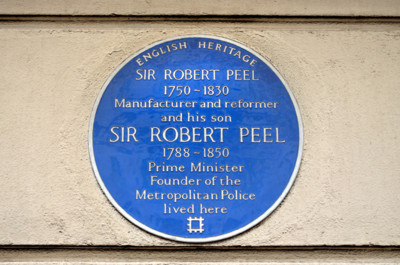"Peelian Principles"
The "peelian principles" summarised the
idea,that Sir Robert Peel,developed to define
an ethical police force.
The approach expressed in these principles is
commonly known as 'policing by consent'.
the idea of this policing,
Police Officer's are regarded as
'citizens in uniform',they exercise their powers
to police their fellow citizens,with the implied
consent of those citizens.

"Policing by Consent"
indicates that the legitimacy of policing in
the eyes of the public,is based upon a
general consensus of support that follows
from transparency about their powers,their
integrity in exercising those powers,and their
accountability for doing so.
"Police Legitimacy"
is the extent to which members of the public
view the police as legitimate,often measured
in terms of the public's willingness to obey
and co-operate with the police.
"Peelian Principles"
The nine principles.were set out in the
"General Instructions" issued to every new
Police Officer in the
Metropolitan Police from 1829.
!) to prevent crime and disorder.
2) to recognise always,that the
power of the police to fulfill their
functions and duties,is dependent
on public approval of
their existence,actions,and
behaviour,and on their ability to
secure and maintain public
respect
3) to recognise always,that to
secure and maintain the respect
and approval of the public,
means,also the securing of the
willing co-operation of the public
in the task of securing observance
of laws.
4) the recognise always,that the
extent to which the co-operation
of the public can be secured,
diminishes proportionately the
necessity of the use of physical
force and compulsion for
achieving police objectives
5) to seek and preserve public
favour,not by pandering to public
opinion,but by constantly impartial
service to law
in complete independence of
policy and without regard to
justice or injustice of the
substance of individual laws.
.
by ready offering of individual
service and friendship to all
members of the public without
regard to their wealth or social
standing,
by ready exercise of courtesy,
and friendly good humour, and
by ready offering of individual
sacrifice in protecting and
preserving life.
6) to use physical force only
when the exercise of persuasion,
advice and warning is found to
be insufficient to obtain public
co-operation to an extent necessary to serve observance
of law,or restore order.
7) to maintain at times a
relationship with the public,
that gives reality to the historic
tradition,
that the police are the public
and that the public are the
police.
8) to recognise always,the need
for strict adherence to police
executive functions,and refrain
from even seeming to usurp
the powers of the judiciary,
of avenging individuals,or the
state and authoritatively judging
guilt and punishing the guilty.
9) to recognise always,that the
test of policy efficiency,is the
absence of crime and disorder,
and not visible evidence of police
action in dealing with them.

REPORTS MADE DIRECTLY
TO POLICE STAFF.
There are many occasions,when
a member of the public,approaches
a Police Officer(s) (Beat Officer)
and/or a PCSO etc.or
within a Police Station at the
public enquiry counter.
Procedure requires the officer(s)
to handle the situation,and adopt
a similar approach to that of a
telephone 'Call Operator'
noting the time of the incident,
and recording full circumstances.
within (police officer's notebook)
Depending on the complaint
reported direct to the officer(s),
it may be necessary to arrange
for a fuller interview,
this would take place within the
Police Station.
if personal details are refused to
be given to the police officer(s)
a record should be made of the
full description of the person
reporting the incident,ie
who they are in the company of,
the vehicle if any etc
It is not uncommon and must
be stressed,that the person
reporting the incident to the
police officer(s),
could well be involved in the
actual incident,or even be the
offender.
If there are reasonable grounds
to suspect involvement,then
the police officer could consider
to arrest the person.
it is not uncommon for the
offender,to speak to police
officer(s),or make reports at or
near the scene of the crime
and/or,even appear to be
helpful and/or even offer
themselves to be a witness.
